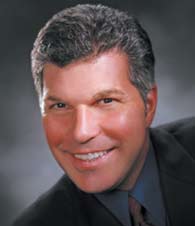|
Executive Interviews: Interview with Carmine Gallo on Steve Jobs
April 2010
-
By Dr. Nagendra V Chowdary
 Carmine Gallo
Carmine Gallo Carmine Gallo, communications coach for the world’s most admired brands. 
What does Steve Jobs mean to
you? What does the brand ‘Steve Jobs’
stand for?
Steve Jobs is the world’s most
captivating storyteller. For more than
three decades, he has turned product
launches into an art form. His
presentations, like his products, are
simple, elegant and yes, beautifully
compelling.
-
Many describe Steve Jobs as the
greatest marketer ever. What are your
impressions about Steve Jobs as a
marketer? What is your assessment of
Apple’s and i-series’ (iPod, iTunes,
iPhone, etc) marketing strategies?
How is it that, for all these years, one
of the top-rated brands never had any
brand ambassador?
Steve Jobs is a great marketer because
he starts with the customer in mind.
He begins by asking questions like:
what will make their lives better?
What tools can we create to make
their lives better? You see, it’s hard to
market products that are created by
engineers for engineers. Jobs’
marketing genius starts with the
products themselves. They solve real
problems.
In one of the widely watched and
read speeches (Commencement
address at Stanford, in 2005), Steve
Jobs observed, “ Your work is going to
fill a large part of your life and the
only way to be truly satisfied is to do
what you believe is great work. And
the only way to do great work is to
love what you do”. What specific
qualities make Steve Jobs stand out as
a unique and enigmatic leader? Was it
his love for what he was doing or was
it his love for what he created?
I thought the 2005 Stanford
Commencement Speech was one of
the greatest speeches I’ve ever heard –
and I’ve heard many. People look at
Steve Jobs and ask themselves, what
is the secret to his success? He gave it
to you. Do what you love. Jobs, and
his friend, Steve Wozniak, loved
electronics. They enjoyed meeting at
a local hobbyist club, The Homebrew
Club, to talk about computers,
electronics, and about how
technology could improve people’s
lives. Jobs loves designs. He once
spent two weeks researching a
washer/dryer for his family’s house,
comparing European and American
designs. These are the things that
guided his life – computers,
technology and design. If that’s not
your calling, don’t expect to be the
next Steve Jobs. But maybe you can be
the Steve Jobs of your industry.
Think about your dreams and, like
Jobs said, follow your heart. It
somehow already knows where it
belongs.
It has been 32 long years since
Steve Jobs and Steve Woznaik began
selling the Apple II, the first
commercially successful massproduced
microcomputer. How do
you look at all these years of Steve
Jobs? What does this mean for the
world of business?
Even if you don’t own a Mac (and I
just recently bought my first
Macbook), you owe Steve Jobs a lot.
He changed your life. He made the PC
approachable and affordable. He
introduced the first computer with
windows icons, graphics, calligraphy
and a mouse! He reinvented the way
we enjoy our music. He reinvented
telecommunications. He reinvented
animation with Pixar. And he’s on
his way to opening an entire new
class of computers with the iPad. His
technology has touched all of us.
What distinguishes Steve Jobs 1,
the young man who started Apple,
and Steve Jobs 2, the guy who came
back to Apple and turned it around?
Steve Jobs has said that being “fired”
was the best thing that could have
happened to him. It forced him to
have a “beginner’s mind” again. He
returned to the most creative period
in his life. Some people buckle in the
face of adversity; Jobs thrived. He
used the setback as a learning
opportunity and came back stronger,
more focused and committed to the
customer.
While Randall E Stross (the
author of Steve Jobs & The NeXt Big
Thing)described Steve Jobs as,
“arrogantly oblivious”, “unmerciful”,
and an “unapologetic snob” who is
“imprisoned…by his selected
historical memory”, others describe
him as “the perfectionist”, “sets
expectations for quality, challenging
the status quo.. and never accepts no
for an answer”, “too good a human
being” and “unparalleled
institutional builder”, etc. Who is the
true Steve Jobs?
Stross comments seem harsh. I’d like
to ask Stross, what was Jobs
oblivious to? He knows what
consumers will want well before the
consumers themselves. He has
revolutionized numerous industries
– computers, telecom, music, and
movies. I’ve heard stories about Jobs
in his youth and I don’t think I would
have wanted to work for him when
he was in twenties. But I also know
people who have partnered with him
in the last few years and found him to
be very generous.
Commenting on Steve Jobs, Andy
Grove said, “There’s no other
company in technology that’s started
with a strong core business and
developed another very strong one.
The rest of us are lucky, or good (if
we’re) right once”. How could Steve
Jobs be right more than once? Was it
his predictive abilities or iconoclastic
arrogance that helped him become
successful more than once?
Steve Jobs doesn’t use focus groups.
Instead, he inspires his team to create
products they would like to use. He
once said that he and Wozniak built
the Apple II for themselves and their
peers. Jobs asks himself, What is it
about a design experience that I
would enjoy?” For example, Apple
introduced the touchscreen for
mobile phones in 2007 with the
iPhone. He challenged his design
team by asking what they wanted in a
Smart Phone experience. Nobody
liked using a stylus. Instead, they
wanted to use a stylus that they were
born with – their fingers. Jobs then
hires the best people in the world to
help his vision come to life.
|
